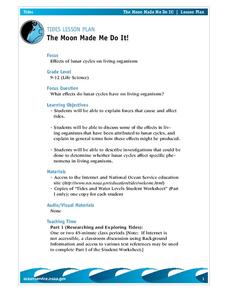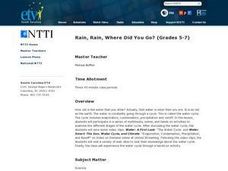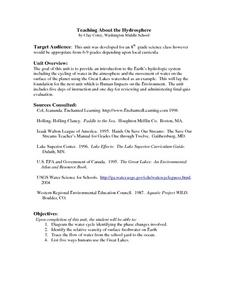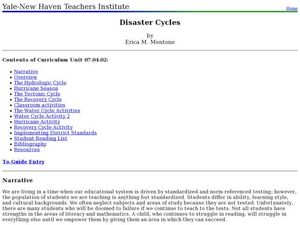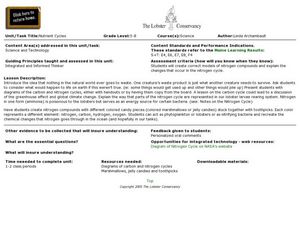Rainforest Alliance
Investments in Forest Carbon
One hundred metric tons of CO2 can accumulate in one acre of forest over time—that's a lot of carbon! In the activity, groups of middle school learners determine what makes forests important. They then solidify the concept by using a...
Learning Games Lab
Nitrogen in Pollutants
Responsible farming is important for maintaining natural resources. Eager scientists complete a WebQuest to explore what happens to nitrogen when it enters the soil. They learn about the chemical makeup of nitrogen-based molecules...
Maryland Department of Education
The Moon Seems to Change: Phases of the Moon
Use Eric Carle's sweet book, Papa, Please get the Moon for Me to learn about phases of the moon. Young schholars use a moon template calendar to chart moon phases for a month, sing lunar phase chants, and create a delicious visual...
Science Matters
Formative Assessment #6: Photosynthesis Cellular Respiration
You know you taught it, but did they learn it!?! A quick formative assessment asks pupils to describe both photosynthesis and cellular respiration before showing how they relate to each other. The lesson marks the 20th lesson in a...
Alabama Wildlife Federation
Bloomin' Butterflies
Get an up close and personal look at the metamorphosis of the butterfly. Pupils take ownership of their learning by collecting butterfly eggs, building a cage, and raising them to adulthood. The lesson resource provides instructions for...
Curated OER
Growing Up
This two-part resource helps little learners understand the life cycle. They view images that show how various creatures change from infancy to toddlerhood. Pupils use a circle to draw any life cycle they wish, showing it in four major...
Curated OER
How Much Salt is in the Gsl Water?
Fourth graders study the water cycle and the different processes that are involved, like precipitation, evaporation, etc. They conduct an experiment observing the water cycle in action and write a hypothesis, observations and...
Alabama Learning Exchange
Why Does It Rain?
Students investigate the water cycle. They observe a demonstration of the water cycle involving ice, water, bowls, and steam, explore various websites, and listen to the book, "The Magic School Bus: Wet All Over: A Book About the Water...
Curated OER
Waterdrops
In this science worksheet, students learn about water cycle, weather, clouds, storms and water resources by completing 8 pages of this full color newsletter. Students read a story, study weather maps, learn to make a rain gauge, learn...
Curated OER
The Moon Made Me Do It!
Students research about how lunar cycles affect living organisms. In this biology instructional activity, students prepare an oral presentation of their research results and analyses. They explore the forces that affect tides.
Curated OER
Rain, Rain, Where Did You Go?
Students study the water cycle including condensation, evaporation, and precipitation. In this water cycle lesson, students watch a video and access assigned web sites to investigate the water cycle. They complete an experiment with a...
Curated OER
Teaching About the Hydrosphere
Eighth graders are introduced to the Earth's hydrologic system including the cycling of water in the atmosphere and the movement of water on the surface of the planet using the Great Lakes watershed as an example.
Curated OER
Water: Our Most Important Beverage
Third graders create a KWL chart about water. In this environmental science lesson plan, 3rd graders demonstrate how much water on Earth is usable. They act out the different stages of the water cycle.
Curated OER
What Goes Around Comes Around
Students investigate how the ocean plays a part in the water cycle. In this earth science lesson plan, students locate a puddle outside and mark it with chalk. Students observe the changes in the water during the next two days.
Curated OER
Biosphere II
Students continue their examination of the existence of life on Earth. In groups, they determine the role of the water cycle and other biogeochemical cycles play in keeping balance on Earth. They participate in experiments to discover...
Curated OER
Lesson 2 Its a Small World (Day 2)
Students are able to explain how the water cycle recycles the earth's water supply. They are able to make use of the knowledge of land forms learned in social studies. Students are able to form a hypothesis on how/why the water cycle...
Curated OER
Exploring the Science of Water in Art: Water Cycle Lesson Plans
Water cycle lesson plans provide an opportunity for teachers to collaborate, and students to discuss this important resource.
Curated OER
WET Science Lesson #3: Comparison of Aquatic and Terrestrial Plants
Elementary life science explorers compare and contrast aquatic and terrestrial plants (elodea and soybeans) in a Venn diagram. Some background information is provided to support direct instruction, and general instructions are provided...
Curated OER
Decomposition, Soil, and Life Cycle Research
Students conduct background research on the decomposition process, soil composition, and the life cycle using the resources provided for Internet searches. They work in collaborative groups to research topics as a particular plant, soil...
Curated OER
Cellular Transport and the Cell Cycle
With a multitude of questions, this worksheet offers learners the opportunity to review their knowledge about the cell cycle. Question types include true/false, word bank, and completing a table about the differences between interphase...
Columbus City Schools
ABC: Acid Base Chemistry
Bubble, bubble, boil and trouble! What causes common substances like baking soda and vinegar to react the way they do? Welcome your junior chemists to the wonders of acid-base chemistry using a comprehensive and fun...
Curated OER
Disaster Cycles
Students explore what causes natural disasters. In this environmental lesson plan, students will spend four weeks using activities to help in their understanding of the Hydrological Cycle, Hurricanes, Plate Tectonics, and the Recovery...
Curated OER
The Life Cycle of the Butterfly
First graders, after listening to fictional and non-fictional literature about caterpillars, and observing caterpillars from egg to butterfly, write a "biography" of a caterpillar using appropriate vocabulary and time lines.
Curated OER
The Nutrient Cycles
Students investigate the circle of sea life by creating nitrogen compound models. In this oceanography lesson, students discuss sea creatures and where their waste goes. Students identify nitrogen cycles in the ocean by...









